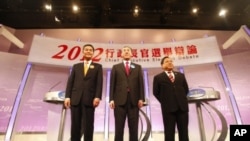A committee of pro-Beijing business tycoons and special interest groups will appoint the next leader of the Hong Kong government Sunday. With a voting system designed to ensure that only loyal Beijing supporters can win, China should have no concerns about the election outcome. However, the reputations of both Beijing’s contenders have been battered after a scandal-ridden campaign that has energized political opposition groups.
Simple process
Six months ago, the appointment of Hong Kong’s next chief executive seemed a mere formality. Members of the so-called "small-circle" election committee - 1,193 broadly pro-China appointees - had a simple choice to make
.
One candidate: former Hong Kong chief secretary Henry Tang - a civil servant and scion of a wealthy Shanghai textiles family, trusted by both Beijing and the territory’s influential business elite. The other option: Leung Chun-ying, former convener of the executive council and loyal Communist party member.
But both men have been politically compromised in recent months.
Scandals
"Beijing expected a gentlemanly contest between the two pro-establishment candidates," said political analyst Willy Lam of the Chinese University of Hong Kong. "But it has degenerated into a mud-slinging smear campaign. Basically, Beijing has lost control of the situation."
Each has accused the other of serious offenses. Leung stands accused of consorting with local criminal groups (triads); Tang confessed to serial adultery; Leung is being investigated on suspicion of profiting from government building contracts.
Lam says most unforgivable to the public is the revelation that Tang illegally constructed a theater, gym and spa complex under the swimming pool of his luxury home. That room alone is twice the size of most Hong Kong apartments. Rather than accept responsibility for breaching planning law, Tang blamed his wife.
Losing credibility
In a city where median family income has remained static for a decade while property prices have risen more than 300 percent, the majority can no longer afford to buy their own home. Tang’s controversies have led to a plummeting approval rating.
"People basically have lost confidence and trust in the personal integrity as well as the administrative capabilities of the two candidates," said Lam.
Although Tang suffers from falling public support, the influential business elite is believed to be suspicious of Leung’s socialist credentials and abrasive personality. The election could go to a second-round in May if no one wins more than 600 votes. But Ho-fung Hung of Johns Hopkins University says this is unlikely.
"If Beijing decides to let the first round be inconclusive and go to the second round, it means a loss of face," said Hung. "The obvious preference is for a very clear majority vote in the first round, and that is it."
Beijing's policy
China’s central government avoided making any statement of preference, until last week. Then, Premier Wen Jiabao remarked that the candidate with most public support should prevail.
As Tang’s popularity has tanked, party leaders are hastily contacting election committee members, to rally support for Leung.
Meanwhile, there is a third candidate in the race, Albert Ho, chairman of the Democratic Party.
"The system is designed in such a way to make sure people like me, unacceptable to Beijing, cannot win," he said. "I think the people appreciate my role in this race. We have to stand united. We must fight hard to strive for democracy in order to protect our freedom and make Hong Kong move forward."
The scandal-plagued election has raised the profile of what could happen if Beijing fulfills a long-pledged goal of universal suffrage by the time of the next chief executive election in 2017.
Opposition
Hong Kong journalist Philip Bowring says there are growing public calls for direct elections.
"We’re promised everyone can vote in five years’ time," said bowring. "Beijing is going to have to think hard about how candidates reach the point of being voted on. Communist party officials are not used to being held accountable, but one thing that may come out of this is more accountability and transparency in government."
The past year in Hong Kong has been marked by public protests against the influx of mainland Chinese and Beijing’s influence on the city. With either one of the pro-Beijing candidates nearly certain to win Sunday’s poll, opposition groups say they are planning protests for Election day.








